 W
WThe African Economic Community (AEC) is an organization of African Union states establishing grounds for mutual economic development among the majority of African states. The stated goals of the organization include the creation of free trade areas, customs unions, a single market, a central bank, and a common currency thus establishing an economic and monetary union.
 W
WThe African Free Trade Zone (AFTZ) is a free trade zone announced at the EAC-SADC-COMESA Summit on 22 October 2008 by the heads of Southern African Development Community (SADC), the Common Market for Eastern and Southern Africa (COMESA) and the East African Community (EAC). The African Free Trade Zone is also referred to as the African Free Trade Area in some official documents and press releases.
 W
WThe African Nuclear Weapon Free Zone Treaty, also known as the Treaty of Pelindaba, establishes a Nuclear-Weapon-Free Zone in Africa. The treaty was signed in 1996 and came into effect with the 28th ratification on 15 July 2009.
 W
WThe Agreement on the Conservation of African-Eurasian Migratory Waterbirds, or African-Eurasian Waterbird Agreement (AEWA) is an independent international treaty developed under the auspices of the United Nations Environment Programme's Convention on Migratory Species. It was founded to coordinate efforts to conserve bird species migrating between European and African nations, and its current scope stretches from the Arctic to South Africa, encompassing the Canadian archipelago and the Middle East as well as Europe and Africa.
 W
WThe Agreement on the Conservation of Cetaceans of the Black Sea, Mediterranean Sea and contiguous Atlantic Area, or ACCOBAMS, is a regional international treaty that binds its States Parties on the conservation of Cetacea in their territories. The Agreement aims is to reduce threats to Cetaceans in the Mediterranean and Black Seas, as well as in the contiguous Atlantic area west of the Straits of Gibraltar.
 W
WThe Bamako Convention is a treaty of African nations prohibiting the import of any hazardous waste. The Convention was negotiated by twelve nations of the Organisation of African Unity at Bamako, Mali in January, 1991, and came into force in 1998.
 W
WThe Convention for the Protection of the Marine Environment and the Coastal Region of the Mediterranean, originally the Convention for Protection of the Mediterranean Sea against Pollution, and often simply referred to as the Barcelona Convention, is a regional convention adopted in 1976 to prevent and abate pollution from ships, aircraft and land based sources in the Mediterranean Sea. This includes but is not limited to dumping, run-off and discharges. Signers agreed to cooperate and assist in dealing with pollution emergencies, monitoring and scientific research. The convention was adopted on 16 February 1976 and amended on 10 June 1995.
 W
WThe Convention on Biological Diversity (CBD), known informally as the Biodiversity Convention, is a multilateral treaty. The Convention has three main goals: the conservation of biological diversity ; the sustainable use of its components; and the fair and equitable sharing of benefits arising from genetic resources. Its objective is to develop national strategies for the conservation and sustainable use of biological diversity, and it is often seen as the key document regarding sustainable development.
 W
WThe Convention on the Prohibition of the Development, Production and Stockpiling of Bacteriological (Biological) and Toxin Weapons and on their Destruction was the first multilateral disarmament treaty banning the production of an entire category of weapons.
 W
WThe Cartagena Protocol on Biosafety to the Convention on Biological Diversity is an international agreement on biosafety as a supplement to the Convention on Biological Diversity (CBD) effective since 2003. The Biosafety Protocol seeks to protect biological diversity from the potential risks posed by genetically modified organisms resulting from modern biotechnology.
 W
WThe Chemical Weapons Convention (CWC) is an arms control treaty that outlaws the production, stockpiling, and use of chemical weapons and their precursors. The full name of the treaty is the Convention on the Prohibition of the Development, Production, Stockpiling and Use of Chemical Weapons and on their Destruction and it is administered by the Organisation for the Prohibition of Chemical Weapons (OPCW), an intergovernmental organization based in The Hague, The Netherlands. The treaty entered into force on 29 April 1997. The Chemical Weapons Convention prohibits the large-scale use, development, production, stockpiling and transfer of chemical weapons. Very limited production for research, medical, pharmaceutical or protective purposes is still permitted. The main obligation of member states under the convention is to effect this prohibition, as well as the destruction of all current chemical weapons. All destruction activities must take place under OPCW verification.
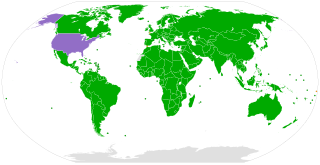 W
WThe United Nations Convention on the Rights of the Child is a human rights treaty which sets out the civil, political, economic, social, health and cultural rights of children. The Convention defines a child as any human being under the age of eighteen, unless the age of majority is attained earlier under national legislation.
 W
WThe Optional Protocol to the Convention on the Rights of the Child on the Involvement of Children in Armed Conflict (OPAC), also known as the child soldier treaty, is a multilateral treaty whereby states agree to: 1) prohibit the conscription into the military of children under the age of 18; 2) ensure that military recruits are no younger than 16; and 3) prevent recruits aged 16 or 17 from taking a direct part in hostilities. The treaty also forbids non-state armed groups from recruiting anyone under the age of 18 for any purpose.
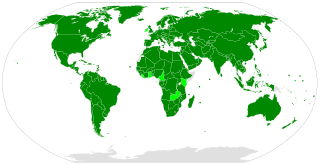 W
WThe Optional Protocol on the Sale of Children, Child Prostitution and Child Pornography is a protocol to the Convention on the Rights of the Child and requires parties to prohibit the sale of children, child prostitution and child pornography.
 W
WCITES is a multilateral treaty to protect endangered plants and animals. It was drafted as a result of a resolution adopted in 1963 at a meeting of members of the International Union for Conservation of Nature (IUCN). The convention was opened for signature in 1973 and CITES entered into force on 1 July 1975.
 W
WThe First Optional Protocol to the International Covenant on Civil and Political Rights is an international treaty establishing an individual complaint mechanism for the International Covenant on Civil and Political Rights (ICCPR). It was adopted by the UN General Assembly on 16 December 1966, and entered into force on 23 March 1976. As of May 2020, it had 35 signatories and 116 states parties. Two of the ratifying states—Jamaica and Trinidad and Tobago—have denounced the protocol.
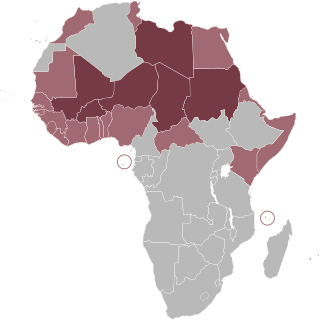 W
WThe Community of Sahel–Saharan States aims to create a free trade area within Africa. There are questions with regard to whether its level of economic integration qualifies it under the enabling clause of the General Agreement on Tariffs and Trade (GATT).
 W
WThe Comprehensive Nuclear-Test-Ban Treaty (CTBT) is a multilateral treaty that bans all nuclear tests, for both civilian and military purposes, in all environments. It was adopted by the United Nations General Assembly on 10 September 1996, but has not entered into force, as eight specific nations have not ratified the treaty.
 W
WThe Convention on the Conservation of Migratory Species of Wild Animals, also known as the Convention on Migratory Species (CMS) or the Bonn Convention, is an international agreement that aims to conserve migratory species within their migratory ranges. The Agreement was signed under the auspices of the United Nations Environment Programme and is concerned with conservation of wildlife and habitats on a global scale.
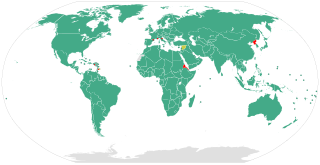 W
WThe United Nations Convention against Corruption (UNCAC) is the only legally binding international anti-corruption multilateral treaty. Negotiated by member states of the United Nations (UN) it has been adopted by the UN General Assembly in October 2003 and entered into force in December 2005. The treaty recognise the importance of both preventive and punitive measures, addresses the cross-border nature of corruption with provisions on international cooperation and on the return of the proceeds of corruption. The UN Office on Drugs and Crime (UNODC) in Vienna serves as Secretariat for the UNCAC. UNCAC's goal is to reduce various types of corruption that can occur across country borders, such as trading in influence and abuse of power, as well as corruption in the private sector, such as embezzlement and money laundering. Another goal of the UNCAC is to strengthen international law enforcement and judicial cooperation between countries by providing effective legal mechanisms for international asset recovery.
 W
WThe World Customs Organization (WCO) is an intergovernmental organization headquartered in Brussels, Belgium. The WCO is noted for its work in areas covering the development of international conventions, instruments, and tools on topics such as commodity classification, valuation, rules of origin, collection of customs revenue, supply chain security, international trade facilitation, customs enforcement activities, combating counterfeiting in support of Intellectual Property Rights (IPR), drugs enforcement, illegal weapons trading, integrity promotion, and delivering sustainable capacity building to assist with customs reforms and modernization. The WCO maintains the international Harmonized System (HS) goods nomenclature, and administers the technical aspects of the World Trade Organization (WTO) Agreements on Customs Valuation and Rules of Origin.
 W
WThe Hague Conventions of 1899 and 1907 are a series of international treaties and declarations negotiated at two international peace conferences at The Hague in the Netherlands. Along with the Geneva Conventions, the Hague Conventions were among the first formal statements of the laws of war and war crimes in the body of secular international law. A third conference was planned for 1914 and later rescheduled for 1915, but it did not take place due to the start of World War I.
 W
WThe United Nations Convention Against Illicit Traffic in Narcotic Drugs and Psychotropic Substances of 1988 is one of three major drug control treaties currently in force. It provides additional legal mechanisms for enforcing the 1961 Single Convention on Narcotic Drugs and the 1971 Convention on Psychotropic Substances. The Convention entered into force on November 11, 1990. As of June 2020, there are 191 Parties to the Convention. These include 186 out of 193 United Nations member states and the Holy See, the European Union, the Cook Islands, Niue, and the State of Palestine.
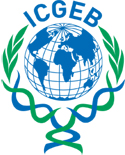 W
WThe International Centre for Genetic Engineering and Biotechnology (ICGEB) was established as a project of the United Nations Industrial Development Organization (UNIDO) in 1983. The Organisation has three Component laboratories with over 45 ongoing research projects in Infectious and Non-communicable diseases, Medical, Industrial and Plant Biology Biotechnology in: Trieste, Italy, New Delhi, India and Cape Town, South Africa.
 W
WThe International Committee of Military Medicine (ICMM) is an international and intergovernmental organization consisting of more than one hundred states. The ICMM was established in 1921, in response to concerns over the lack of care provided during World War I. It was created to strengthen cooperation between the health services of the armed forces worldwide.
 W
WThe Bureau international des expositions (BIE) is an intergovernmental organization created to supervise international exhibitions falling under the jurisdiction of the Convention Relating to International Exhibitions.
 W
WThe International Fund for Agricultural Development is an international financial institution and a specialised agency of the United Nations that works to address poverty and hunger in rural areas of developing countries. It is the only multilateral development organization that focuses solely on rural economies and food security.
 W
WThe International Mobile Satellite Organization (IMSO) is the intergovernmental organization that oversees certain public satellite safety and security communication services provided via the Inmarsat satellites. Some of these services concern:Global Maritime Distress Safety System (GMDSS) established by the International Maritime Organization (IMO) Search and rescue co-ordinating communications Maritime safety information (MSI) broadcasts Aeronautical mobile satellite (route) service, or AMS(R)S, through compliance with the Standards and Recommended Practices (SARPs) established by the International Civil Aviation Organization (ICAO) General communications
 W
WFascist Italy maintained several concentration camps in Cyrenaica during the later phase of its occupation of that country. After the initial invasion in 1911, the Italian control over much of the country remained ineffective. In the face of the armed Arab opposition, mainly in Cyrenaica under the leadership of Omar Mukhtar, Italian forces under the Generals Pietro Badoglio and Rodolfo Graziani waged punitive pacification campaigns which turned into brutal and bloody acts of repression.
 W
WThe Kyoto Protocol is an international treaty which extends the 1992 United Nations Framework Convention on Climate Change (UNFCCC) that commits state parties to reduce greenhouse gas emissions, based on the scientific consensus that (part one) global warming is occurring and (part two) it is extremely likely that human-made CO2 emissions have predominantly caused it. The Kyoto Protocol was adopted in Kyoto, Japan, on 11 December 1997 and entered into force on 16 February 2005. There are currently 192 parties (Canada withdrew from the protocol, effective December 2012) to the Protocol.
 W
WSearch and rescue (SAR) is the search for and provision of aid to people who are in distress or imminent danger. The general field of search and rescue includes many specialty sub-fields, typically determined by the type of terrain the search is conducted over. These include mountain rescue; ground search and rescue, including the use of search and rescue dogs; urban search and rescue in cities; combat search and rescue on the battlefield and air-sea rescue over water.
 W
WThe Arab Maghreb Union (AMU) is a trade agreement aiming for economic and future political unity among Arab countries of the Maghreb in North Africa. Its members are the nations of Algeria, Libya, Mauritania, Morocco and Tunisia. The Union has been unable to achieve tangible progress on its goals due to deep economic and political disagreements between Morocco and Algeria regarding, among others, the issue of Western Sahara. No high level meetings have taken place since 3 July 2008, and commentators regard the Union as largely dormant.
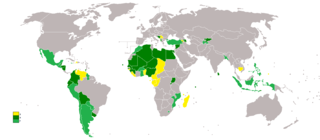 W
WThe International Convention on the Protection of the Rights of All Migrant Workers and Members of Their Families is a United Nations multilateral treaty governing the protection of migrant workers and families. Signed on 18 December 1990, it entered into force on 1 July 2003 after the threshold of 20 ratifying States was reached in March 2003. The Committee on Migrant Workers (CMW) monitors implementation of the convention, and is one of the seven UN-linked human rights treaty bodies.
 W
WThe Montreal Protocol on Substances that Deplete the Ozone Layer, also known simply as the Montreal Protocol, is an international treaty designed to protect the [ozone layer] by phasing out the production of numerous substances that are responsible for ozone depletion. Signed 26 August 1987, it was made pursuant to the 1985 Vienna Convention for the Protection of the Ozone Layer, which established the framework for international cooperation in addressing ozone depletion. The Montreal Protocol entered into force on 26 August 1989, and has since undergone nine revisions, in 1990 (London), 1991 (Nairobi), 1992 (Copenhagen), 1993 (Bangkok), 1995 (Vienna), 1997 (Montreal), 1998 (Australia), 1999 (Beijing) and 2016 (Kigali).
 W
WThe International Olive Council (IOC) is an intergovernmental organization of states that produce olives or products derived from olives, such as olive oil.
 W
WA World Heritage Site is a landmark or area with legal protection by an international convention administered by the United Nations Educational, Scientific and Cultural Organization (UNESCO). World Heritage Sites are designated by UNESCO for having cultural, historical, scientific or other form of significance. The sites are judged to contain "cultural and natural heritage around the world considered to be of outstanding value to humanity". To be selected, a World Heritage Site must be a somehow unique landmark which is geographically and historically identifiable and has special cultural or physical significance. For example, World Heritage Sites might be ancient ruins or historical structures, buildings, cities, deserts, forests, islands, lakes, monuments, mountains, or wilderness areas. A World Heritage Site may signify a remarkable accomplishment of humanity, and serve as evidence of our intellectual history on the planet, or it might be a place of great natural beauty. As of June 2020, a total of 1,121 World Heritage Sites exist across 167 countries; the three countries with most sites are China, Italy and Spain (48).
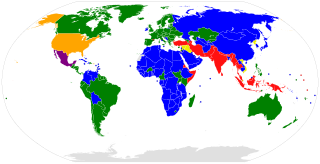 W
WProtocol I is a 1977 amendment protocol to the Geneva Conventions relating to the protection of victims of international conflicts, where "armed conflicts in which peoples are fighting against colonial domination, alien occupation or racist regimes" are to be considered international conflicts. It reaffirms the international laws of the original Geneva Conventions of 1949, but adds clarifications and new provisions to accommodate developments in modern international warfare that have taken place since the Second World War.
 W
WProtocol II is a 1977 amendment protocol to the Geneva Conventions relating to the protection of victims of non-international armed conflicts. It defines certain international laws that strive to provide better protection for victims of internal armed conflicts that take place within the borders of a single country. The scope of these laws is more limited than those of the rest of the Geneva Conventions out of respect for sovereign rights and duties of national governments.
 W
WThe Convention on Psychotropic Substances of 1971 is a United Nations treaty designed to control psychoactive drugs such as amphetamine-type stimulants, barbiturates, benzodiazepines, and psychedelics signed in Vienna, Austria on 21 February 1971. The Single Convention on Narcotic Drugs of 1961 did not ban the many newly discovered psychotropics, since its scope was limited to drugs with cannabis, coca, and opium-like effects.
 W
WThe Ramsar Convention on Wetlands of International Importance Especially as Waterfowl Habitat is an international treaty for the conservation and sustainable use of wetlands. It is also known as the Convention on Wetlands. It is named after the city of Ramsar in Iran, where the convention was signed in 1971.
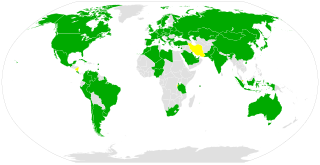 W
WThe Convention on Registration of Objects Launched into Outer Space was adopted by the United Nations General Assembly in 1974 and went into force in 1976. As of December 2018, it has been ratified by 69 states.
 W
WThe Rotterdam Convention is a multilateral treaty to promote shared responsibilities in relation to importation of hazardous chemicals. The convention promotes open exchange of information and calls on exporters of hazardous chemicals to use proper labeling, include directions on safe handling, and inform purchasers of any known restrictions or bans. Signatory nations can decide whether to allow or ban the importation of chemicals listed in the treaty, and exporting countries are obliged to make sure that producers within their jurisdiction comply.
 W
WThe Single Convention on Narcotic Drugs of 1961 is an international treaty to prohibit production and supply of specific drugs and of drugs with similar effects except under licence for specific purposes, such as medical treatment and research. As noted below, its major effects included updating the Paris Convention of 13 July 1931 to include the vast number of synthetic opioids invented in the intervening thirty years and a mechanism for more easily including new ones. From 1931 to 1961, most of the families of synthetic opioids had been developed, including drugs related to methadone, pethidine (meperidine/Demerol), morphinans and dextromoramide. Research on fentanyls and piritramide was also nearing fruition at that point.
 W
WThe Convention on International Liability for Damage Caused by Space Objects, also known as the Space Liability Convention, is a treaty from 1972 that expands on the liability rules created in the Outer Space Treaty of 1967. In 1978, the crash of the nuclear-powered Soviet satellite Kosmos 954 in Canadian territory led to the only claim filed under the Convention.
 W
WThe Convention relating to the Status of Stateless Persons is a 1954 United Nations multilateral treaty that aims to protect stateless individuals.
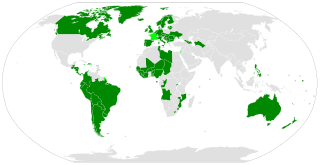 W
WThe Convention on the Reduction of Statelessness is a 1961 United Nations multilateral treaty whereby sovereign states agree to reduce the incidence of statelessness. The Convention was originally intended as a Protocol to the Convention Relating to the Status of Refugees, while the 1954 Convention Relating to the Status of Stateless Persons was adopted to cover stateless persons who are not refugees and therefore not within the scope of the Convention Relating to the Status of Refugees.
 W
WStockholm Convention on Persistent Organic Pollutants is an international environmental treaty, signed in 2001 and effective from May 2004, that aims to eliminate or restrict the production and use of persistent organic pollutants (POPs).
 W
WThe Committee Against Torture (CAT) is a body of human rights experts that monitors implementation of the United Nations Convention against Torture by state parties. The Committee is one of eight UN-linked human rights treaty bodies. All state parties are obliged under the Convention to submit regular reports to the CAT on how rights are being implemented. Upon ratifying the Convention, states must submit a report within one year, after which they are obliged to report every four years. The Committee examines each report and addresses its concerns and recommendations to the state party in the form of "concluding observations." Under certain circumstances, the CAT may consider complaints or communications from individuals claiming that their rights under the Convention have been violated.
 W
WThe Convention against Torture and Other Cruel, Inhuman or Degrading Treatment or Punishment is an international human rights treaty, under the review of the United Nations, that aims to prevent torture and other acts of cruel, inhuman, or degrading treatment or punishment around the world.
 W
WThe United Nations Convention against Transnational Organized Crime is a 2000 United Nations-sponsored multilateral treaty against transnational organized crime.
 W
WThe United Nations Industrial Development Organization (UNIDO) is a specialized agency of the United Nations that assists countries in economic and industrial development. It is headquartered at the UN Office in Vienna, Austria, with a permanent presence in over 60 countries. As of April 2019, UNIDO comprises 170 member states, which together set the organization's policies, programs, and principles through the biannual General Conference.
 W
WThe Vienna Convention on Consular Relations is an international treaty that defines a framework for consular relations between sovereign states. It codifies many consular practices that originated from state custom and various bilateral agreements between states.
 W
WThe Vienna Convention on Diplomatic Relations of 1961 is an international treaty that defines a framework for diplomatic relations between independent countries. It specifies the privileges of a diplomatic mission that enable diplomats to perform their function without fear of coercion or harassment by the host country. This forms the legal basis for diplomatic immunity. Its articles are considered a cornerstone of modern international relations. As of October 2018, it has been ratified by 192 states.
 W
WThe Vienna Convention on the Law of Treaties (VCLT) is an international agreement regulating treaties between states. Known as the "treaty on treaties", it establishes comprehensive rules, procedures, and guidelines for how treaties are defined, drafted, amended, interpreted, and generally operated. The VCLT is considered a codification of customary international law and state practice concerning treaties.
 W
WThe World Health Organization Framework Convention on Tobacco Control is a treaty adopted by the 56th World Health Assembly held in Geneva, Switzerland on 21 May 2003. It became the first World Health Organization treaty adopted under article 19 of the WHO constitution. The treaty came into force on 27 February 2005. It had been signed by 168 countries and is legally binding in 181 ratifying countries. There are currently 15 United Nations member states that are non-parties to the treaty.
 W
WThe Convention on the Elimination of all Forms of Discrimination Against Women (CEDAW) is an international treaty adopted in 1979 by the United Nations General Assembly. Described as an international bill of rights for women, it was instituted on 3 September 1981 and has been ratified by 189 states. Over fifty countries that have ratified the Convention have done so subject to certain declarations, reservations, and objections, including 38 countries who rejected the enforcement article 29, which addresses means of settlement for disputes concerning the interpretation or application of the Convention. Australia's declaration noted the limitations on central government power resulting from its federal constitutional system. The United States and Palau have signed, but not ratified the treaty. The Holy See, Iran, Somalia, Sudan, and Tonga are not signatories to CEDAW.
 W
WThe World Tourism Organization (UNWTO) is the United Nations specialized agency entrusted with the promotion of responsible, sustainable and universally accessible tourism. It is the leading international organization in the field of tourism, which promotes tourism as a driver of economic growth, inclusive development and environmental sustainability and offers the sector leadership and support in advancing knowledge and tourism policies worldwide. It serves as a global forum for tourism policy issues and a practical source of tourism research and knowledge. It encourages the implementation of the Global Code of Ethics for Tourism to maximize the contribution of tourism to socio-economic development, while minimizing its possible negative impacts, and is committed to promoting tourism as an instrument in achieving the United Nations Sustainable Development Goals (SDGs), geared towards eliminating poverty and fostering sustainable development and peace worldwide.
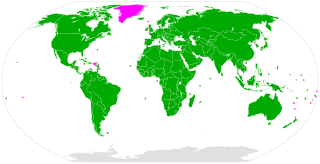 W
WThe Convention concerning the Prohibition and Immediate Action for the Elimination of the Worst Forms of Child Labour, known in short as the Worst Forms of Child Labour Convention, was adopted by the International Labour Organization (ILO) in 1999 as ILO Convention No 182. It is one of eight ILO fundamental conventions.